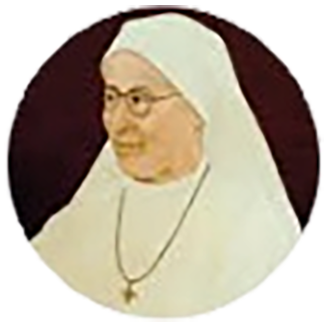Mathias was born to Mathias Wolff and Anna Maria Zenner on 6th March 1779 in Diekirk, a village in a very small country Luxemburg in Europe. From his very early childhood Mathias was very intelligent, talented and so great was his involvement at every level, that the saying, “What good can come from Diekirch”, had to be reversed, to wonder and admiration! He was brought up in an atmosphere of ‘Kindness always and severity when necessary’ by his noble parents. He was born and brought up in a pious, God fearing, Catholic family, and his uncle priest was his inspiration, mentor and a guide for him to grow up as a faithful child of God.
The prevalent French Revolution in 1789-1799 affected his life and that of his country folk; however, it also offered a turning point in his life and it pushed him forward to realize his long cherished childhood dream of becoming a priest, a Jesuit, to be a man for others. The Jesuit order was suppressed in Europe from the year 1773 to 1814 as the then Ruling Party (Protestants) could not tolerate the powerful influence of the Jesuits in Education and other fields. So young Mathias was ordained as a Diocesan Priest in 1802 and later when the Jesuit order was restored, he did a year of Novitiate under the Jesuits in 1815 thus becoming Fr. Mathias Wolff S.J. He knew that he was surrendering himself for ‘Ad Majorem Deum Gloria’ – i.e., – for the greater honor and glory of God – totally dedicating himself to God in the service of others.
Fr. Mathias was sent as a missionary to Culemborg, Holland, his first mission as a Jesuit in the year 1816. Nothing can be achieved without struggles, difficulties, rejection, sufferings and persecutions; but all turn out to be successful through prayer, penance and perseverance. His spirit of prayer and penance yielded a hundredfold fruits of peace, joy and love to be shared with others.
The impact of French revolution affected the Catholic faith to a great extent. It was the miserable plight of the girls and women of Culemborg in Holland that moved Fr. Mathias to think of a more relevant, more reaching out and more comforting initiatives. Their oppression, powerlessness, mute endurance of the atrocities and neglect by the society, disturbed him. Education of the girls was not popular; hence, they were in every way, voiceless. However, young and enthusiastic Fr. Mathias had a vision, he had a dream and he would take every risk and every possible means to realize his dream. Subsequently he would motivate and inspire the generous and willing young girls to be the instruments in bringing about transformation in the Parish through their Education. His person, his self-sacrificing, exemplary life, his spirituality and teachings attracted the young, enthusiastic and willing girls to join hands to bring about the needed change in the society. Thus, Fr. Mathias Wolff decided to start a woman’s congregation to educate the poor girls and to reach out to those in need.
From 28th October 1857, Fr. Mathias Wolff’s ill health affected his intellect, memory and speech. On October 31st 1857 at the age of 78, bequeathing his spirit to the Society, full of trust in God’s mercy, as he always wished he breathed last, on a Saturday, the day on which his heavenly Mother is especially honored.
Mathias Wolff was buried first in the ground of the Jesuit cemetery at Culemborg market-yard. His tomb was opened thrice in 1867, 1923 and in 1970, the mortal remains of Fr. Wolff were shifted from Mariakroon to the Cemetery of JMJ sisters at Heeswijk.


